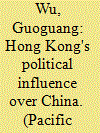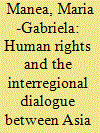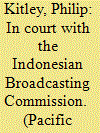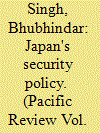|
|
|
Sort Order |
|
|
|
Items / Page
|
|
|
|
|
|
|
| Srl | Item |
| 1 |
ID:
082780


|
|
|
|
|
| Publication |
2008.
|
| Summary/Abstract |
This article explores how Hong Kong has exercised political influence on China since the transfer of sovereignty in 1997, and tries to comprehend such seemingly impossible influences by reinterpreting the concept of sovereignty. It argues that the British Hong Kong existed as a 'reference society' for China's modernization and helped to change Chinese perceptions of capitalism. As this resulted in Chinese recognition of the legitimacy of Hong Kong's colonial institutions, which were featured with political legacies of civic freedom and the rule of law, it also reveals the institutional dimension of sovereignty. Secondly, the information flow from Hong Kong to China reflects a communicative (in contrast to coercive) nature of sovereignty, which highlights Hong Kong's central position in the Chinese world of information. Thirdly, Hong Kong's ongoing democratization challenges Chinese authoritarianism through societal interactions that are beyond state control. Conceptually, in this article, state sovereignty is argued as being something fluid and constantly reshaped in everyday practice with institutional, informative, and interactive dynamics; practically, it attempts to find some remaining 'silver lining' to the growing authoritarian Chinese clouds above Hong Kong as reversing the logic of examining external factors in democratization
|
|
|
|
|
|
|
|
|
|
|
|
|
|
|
|
| 2 |
ID:
082784


|
|
|
|
|
| Publication |
2008.
|
| Summary/Abstract |
Since the early 1990s, human rights have been a contentious issue for relations between the Association of Southeast Asian Nations (ASEAN) and the European Union (EU), especially in the Asia-Europe Meeting (ASEM). It is an issue that has constantly led to tensions in interregional cooperation. However, the ASEAN-EU dialogue on human rights has, in fact, had a significant impact on regional dynamics by stimulating the process of regional identity formation, especially in Southeast Asia. The core mechanism through which this development takes place is that of interaction, the process in which the two regional groupings engage while negotiating human rights policy. It can be argued, therefore, that interregional and intraregional human rights interactions are mutually dependent. ASEAN's rather confrontational mode of interaction with the European Union in relation to human rights has served as a catalyst for the dynamic growth of a collective definition of self in ASEAN. It has led to an 'essentialization' of ASEAN's idea of self as opposed to a common other, something which has undermined the possibility of maintaining an interregional dialogue that is not confrontational. However, it has also contributed to the development of a regional space for communicating about human rights and has thus played a central role in the gradual transformation of ASEAN's collective identity formation.
|
|
|
|
|
|
|
|
|
|
|
|
|
|
|
|
| 3 |
ID:
082783


|
|
|
|
|
| Publication |
2008.
|
| Summary/Abstract |
President Soeharto's resignation on May 1998 came as a result of intense dissatisfaction with his management of the economy and public dissatisfaction with rent-seeking activities of his family and cronies. The resignation ushered in a heady period of reformasi or reform, marked by a euphoric return to democratic national elections in 1999 and legislation which sought to write reform into national politics and governance. The Press Act of 23 September 1999, electoral reform, the abolition of the Department of Information and the creation of new independent watchdog bodies were part of a process which placed the rule of law and accountability to the public centre stage in Indonesia. In the five years since the 1999 national elections, however, conservative political and cultural forces have resorted to litigation and law and order rhetoric to slow down and even reverse the reform agenda. In this article the process of reform resistance through legal deadweighting is documented and explored in an examination of an excessive resort to judicial remedies brought against the work of the Indonesian Broadcasting Commission in its first period of office.
|
|
|
|
|
|
|
|
|
|
|
|
|
|
|
|
| 4 |
ID:
082781


|
|
|
|
|
| Publication |
2008.
|
| Summary/Abstract |
The paper argues that a significant change in Japanese post-Cold War security policy has occurred, as compared to its Cold War security policy. Instead of relying solely on power-based realist variables, this paper argues that a significant change is taking place because of the shift in Japan's security identity from a 'peace state' to an 'international state'. What this refers to is that Japan sees itself as playing a more active role in military-strategic affairs in the post-Cold War period due to the normative structure shift within Japan in relation to the practices and role(s) in the regional and international security environment. To show change in Japan's security identity and its resultant security behaviour, norms in three areas that define and shape its security policy are contrasted - Japan's definition of national security; its contribution, in military terms, to regional and international security affairs; and the level of agency (control) Japan has in its security policy. The international-state security identity is increasingly recognised by the members of Japan's security policy-making elite and is used to formulate Japan's security policy in the post-Cold War period. It is also gradually being accepted by the larger Japanese society and has become a permanent feature of Japan's security discourse
|
|
|
|
|
|
|
|
|
|
|
|
|
|
|
|
| 5 |
ID:
082782


|
|
|
|
|
| Publication |
2008.
|
| Summary/Abstract |
Is a higher degree of party and party system institutionalization positively correlated with the consolidation of democracy, defined here as the prevention of democratic breakdown? In order to answer this question, it is useful to compare different levels and types of institutionalization in three Southeast Asian electoral democracies. Institutionalized party systems are characterized, according to Mainwaring and Torcal, by 'stability of interparty competition.' Moreover, the distinction made by Levitsky ('value infusion' versus 'behavioural routinization') with reference to the institutionalization of individual parties will be employed. The empirical research of this paper finds that most Indonesian parties are better institutionalized than those in the Philippines and Thailand with reference to 'value infusion.' In addition, the interparty competition is more stable in Indonesia. Therefore, the probability of a collapse of the party system in the Philippines and Thailand is much higher. This, in turn, renders the democracies in these countries more fragile and prone to political crises or even sudden breakdowns. The early organizational consolidation of social cleavages, such as in Indonesia, enhances institutionalization. A few of the most important parties are socially rooted and have strong linkages to civil and/or religious organizations. Furthermore, the relationship between central and local elites appears to be essential: strong bosses or cliques undermine institutionalization in the Philippines and in Thailand, respectively. However, in recent years there has also been a tendency towards convergence. There are signs of regression in Indonesia, such that the future of the party system is open to question. This article calls for caution with respect to the stated causal relation between institutionalization and democratic consolidation, and it questions some aspects of the concept.
|
|
|
|
|
|
|
|
|
|
|
|
|
|
|
|
| 6 |
ID:
082779


|
|
|
|
|
| Publication |
2008.
|
| Summary/Abstract |
International experience tells that public services often fail to work for those in need. To make things work requires complex institutional changes that are difficult to come by, let alone sustain. This paper examines the situation of rural public service provision in China and a local attempt to revamp the service provision institution through adjusting the mix of state and the market. It reveals the dialectical process of policy evolution whereby innovation, and resistance to it, has emerged
|
|
|
|
|
|
|
|
|
|
|
|
|
|
|
|
|
|
|
|
|